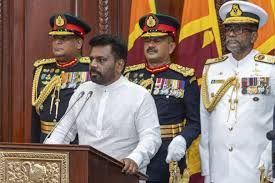Synopsis
The article examines the complexities of Sri Lankan politics, particularly focusing on Anura Kumara Dissanayake and the Sinhala Buddhist vote. Despite Dissanayake garnering approximately 57,401 votes, he faced significant opposition, with nearly double that number supporting other candidates. Many voters criticized him for perceived anti-Buddhist sentiments within his party, leading to backlash against his campaign.
As Sri Lanka embarks on a new chapter under its recent presidency, the political landscape remains deeply polarized. The discourse surrounding Sinhala Buddhist identity and its implications for governance and social cohesion has intensified, particularly after the last elections that saw substantial support for Gotabaya Rajapaksa from Sinhala Buddhist voters. This support raises critical questions about nationalism, identity politics, and the future of Sri Lanka’s democracy.
Many political commentators suggest that Gotabaya’s electoral victory was influenced by accusations of manipulation and racism, resulting in devastating events in Sri Lanka. However, the specifics of these claims are still unfolding and will require further investigation.
High-profile figures like Anura Kumara Dissanayake have portrayed Sinhala Buddhist voters as inherently racist, overlooking the complex socio-political motivations behind their choices. While Dissanayake critiques Sinhala Buddhist nationalism, it is essential to recognize that many who supported Rajapaksa did so not from a place of racism, but from a desire for stability and security amid ongoing socio-economic challenges stemming from the previous Yahapana government and perceived anti-Sinhala, anti-Buddhist threats.
In a nation where Sinhala Buddhists often feel marginalized in discussions about governance and rights, acknowledging their historical and cultural significance is crucial. This community, particularly the Kandyan peasants, has a rich legacy of resistance against invasions, with their cultural identity deeply intertwined with the country’s narrative since the time of King Pandukhabaya.
Dr. Sudath Gunasekara emphasizes the significance of the Kandyan community in Sri Lanka, noting that the Kandyan matters of 1951 serve as a poignant reminder of the sacrifices made by countless individuals who dedicated their lives to building the nation. He points out that over five million Kandyan peasants, spread across at least sixteen districts, continue to face neglect and marginalization. This community, historically rich in cultural and agricultural contributions, has been betrayed by the closure of the Department of Kandyan Peasantry Rehabilitation, which once aimed to address their unique challenges and needs. Gunasekara argues that successive governments have failed to address this problem, reflecting a broader neglect of the legacy and rights of the Kandyan people, who have played a crucial role in Sri Lanka’s history.
It is vital for any government, especially one led by Dissanayake, to understand the plight of the Kandyan community, who are the true Bhumiputras of the Central Hills. Their historical connection to the land and the injustices they faced, particularly under British rule, must be addressed. Dissanayake’s past statements and actions, perceived as anti-Buddhist and anti-Sinhala, have alienated many voters.
The Aragalaya movement, aimed at challenging the status quo, attracted a diverse range of participants, including those with anti-Buddhist sentiments. While it symbolized a call for accountability and reform, the movement also showcased activities that undermined national unity, including acts against Sinhala Buddhist symbols. Such actions raise significant concerns about the movement’s impact on the national identity.
Despite Anura Kumara Dissanayake receiving approximately 57,40179 votes, nearly double that number supported other presidential candidates, highlighting his lack of broad-based appeal. Many voters expressed disapproval of Dissanayake and his party, pointing to perceived anti-Buddhist sentiments among his supporters and leaders. This issue became a significant factor in the backlash against his campaign, revealing a critical divide in public perception.
The global resurgence of nationalism serves as a cautionary tale for Sri Lanka, illustrating how identity-based politics can exacerbate societal polarization and heighten tensions among different ethnic and religious groups. Political leaders must prioritize inclusive dialogue that recognizes the contributions of all communities while also honoring the inherent rights of the indigenous peoples who have built the nation over thousands of years, sacrificing their lives in the process. Fostering unity is essential, but it must avoid deepening divisions and the power devolution.
While some may link communism with anti-religious sentiments, many communist leaders prioritize national interests and social cohesion. Figures like Fidel Castro and Mao Zedong sought to unify their nations under a nationalist agenda, balancing ideology with cultural identity.
As Sri Lanka navigates its political future, meaningful discourse about identity, rights, and governance is essential. Acknowledging the historical significance of Sinhala Buddhists while addressing the needs and aspirations of all communities can lead to a more cohesive and resilient society. The considerable number of voters opposing Dissanayake illustrates a growing awareness of the need for leadership that prioritizes unity over division. In an era of rising nationalism, Sri Lanka must balance its rich cultural heritage with the ideals of democracy and inclusivity, ensuring every voice is heard and respected.
Dissanayake must avoid bias as a political leader and strive for honesty rather than seeking personal political gain. He should recognize the sacrifices made by Kandyan peasants and work to uplift the nearly six million Kandyan peasants. Understanding that a significant portion of his voters are Sinhala Buddhists, Dissanayake must advocate for their rights and the broader national identity, providing leadership that addresses historical injustices and seeks solutions for all native peoples in Sri Lanka.
Anura Kumara Dissanayake cannot dismiss the requests of Kandyan peasants or the fight for Sinhala Buddhist rights as mere racism any longer. It is essential to recognize these issues as legitimate concerns that deserve serious attention and solutions. Moreover, any backstabbing groups cannot ignore or covertly deny the inherent rights of the native peoples. This is a land where a Sinhala Buddhist nation exists, and their voices must not be sidelined.
Only then can he demonstrate his commitment as a true and honest leader for the nation.
By Palitha Ariyarathna
Real System Change: Shaping Sri Lanka’s Future

